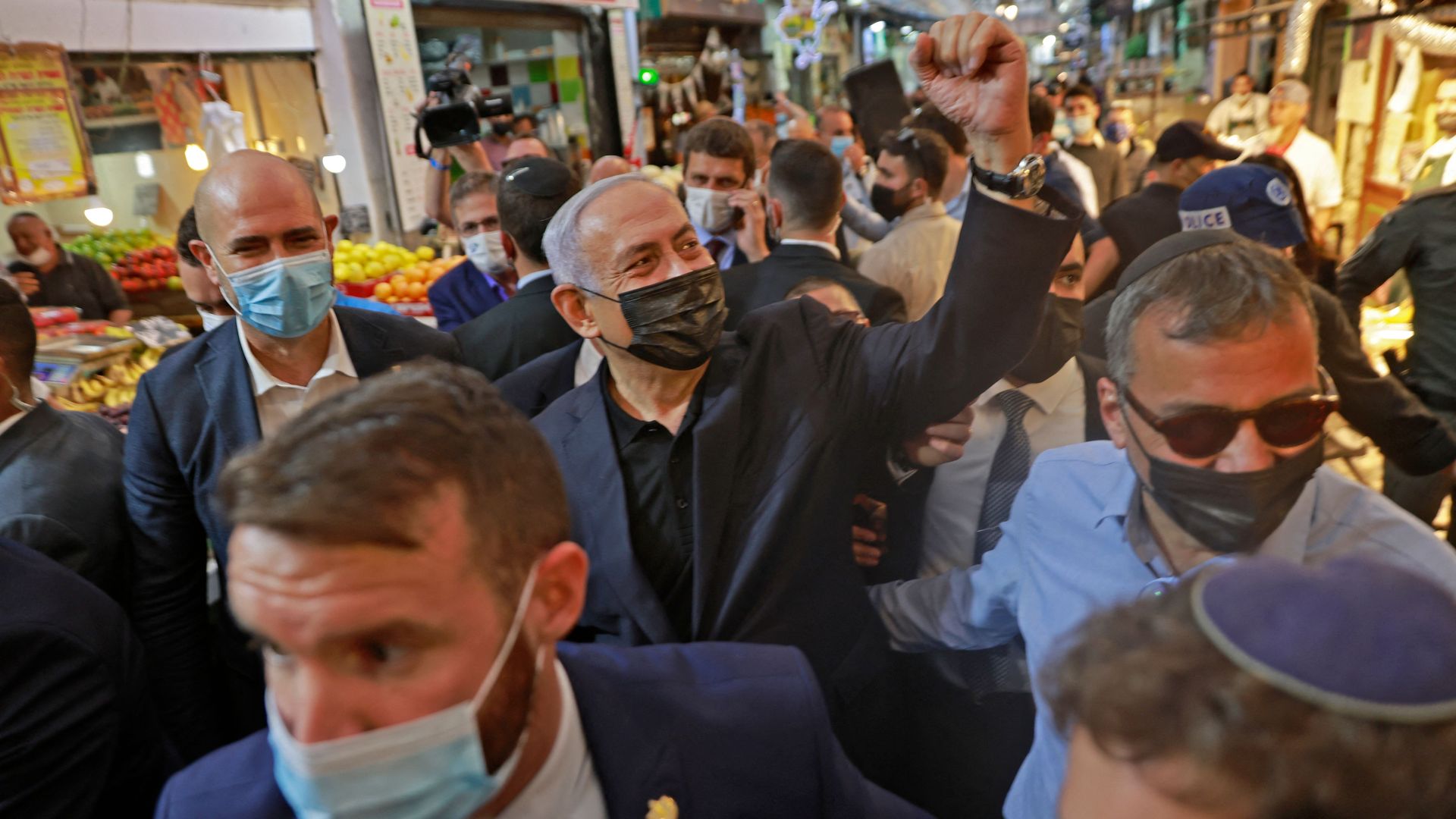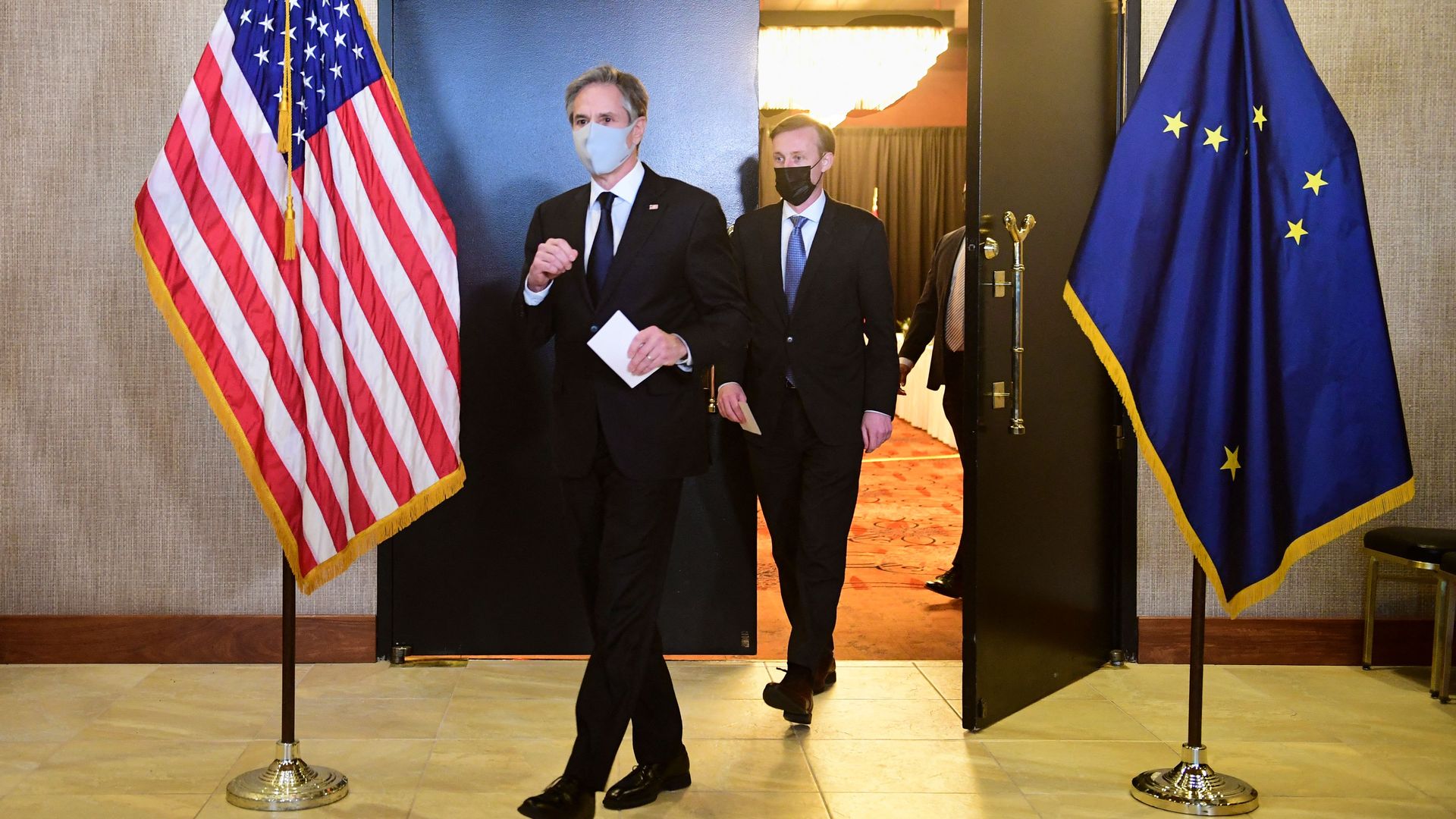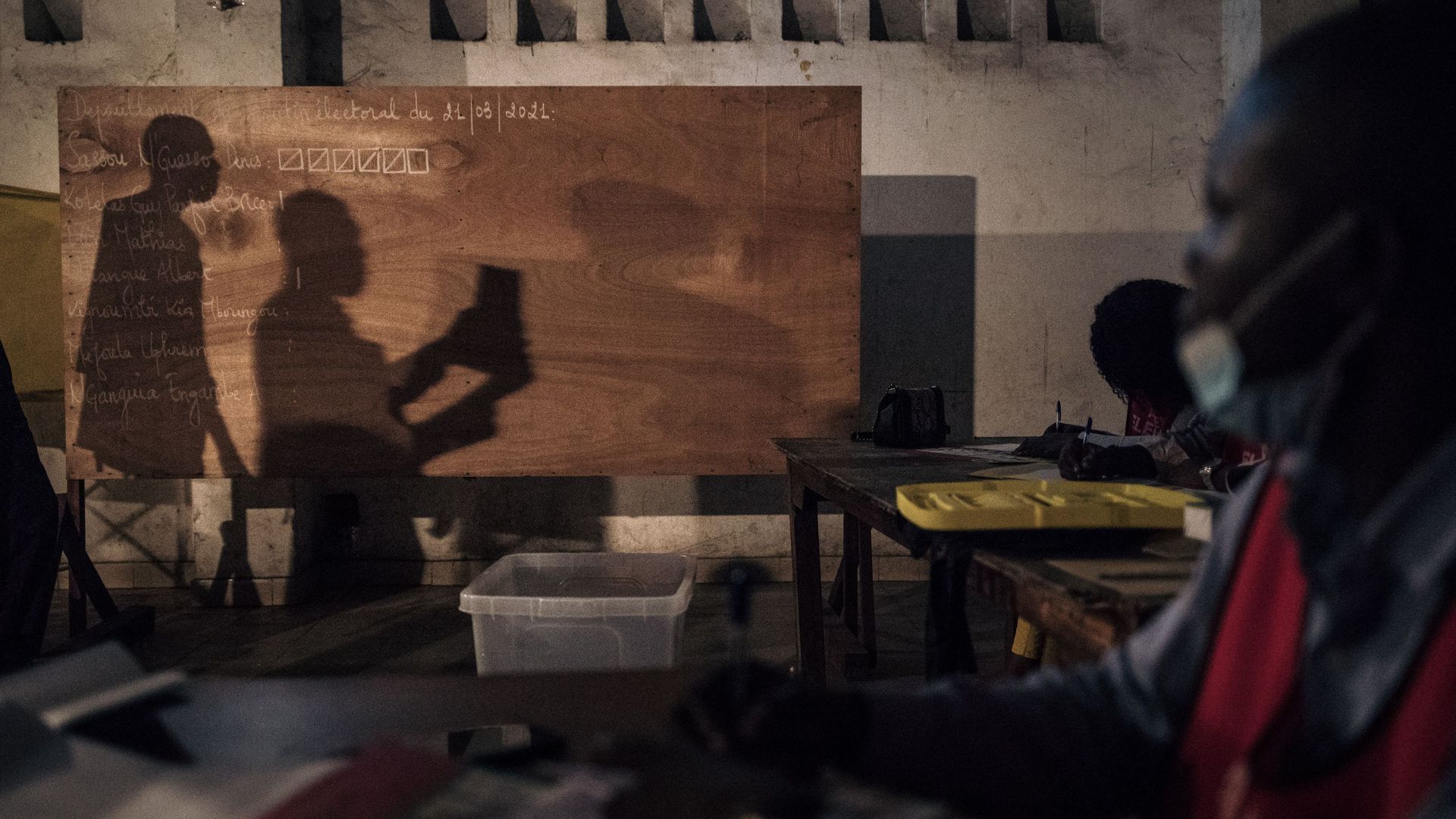| | | | | | | Presented By Babbel | | | | Axios World | | By Dave Lawler ·Mar 22, 2021 | | Welcome back to Axios World. - Tonight we're starting with Israel's election, navigating three major vaccine dilemmas and marking an election day death in Congo-Brazzaville (1,838 words, 6½ minutes). Thanks for being a reader.
New arrival? Sign up here. | | | | | | 1 big thing: Netanyahu closes in on long-sought victory |  | | | Netanyahu campaigns in Jerusalem on the eve of the election. Photo: Menahem Kahana/AFP via Getty | | | | Israeli Prime Minister Benjamin Netanyahu will contest his fourth election in two years on Tuesday, fighting for a parliamentary majority that could help him undercut his ongoing corruption trial, Axios' Barak Ravid and I write. Why it matters: Three inconclusive elections have left Israel locked in a prolonged political crisis as Netanyahu fights for his political and legal survival. This time, Israel's longest-serving prime minister faces a divided opposition and has a clear opportunity to finally win a 61-seat majority. The state of play: The latest polls show Netanyahu's right-wing bloc and a broad anti-Netanyahu bloc both winning 60 seats. What to watch: If Netanyahu manages to get to 61, he will form the most religious and conservative coalition in the history of the country. His rivals claim that such a government could challenge the democratic character of the country. - Netanyahu denies that he plans to fire the attorney general or pass laws to suspend his corruption trial, but several of his would-be coalition partners have expressed support for such steps.
- If Netanyahu's bloc narrowly fails to win a majority, Israel is likely to head for a fifth round of elections.
Driving the news: Both Netanyahu and his primary rival, centrist Yair Lapid, rallied their bases on the eve of the election. - Lapid needs to boost turnout in Tel Aviv, Haifa and the other big cities in the center of Israel.
- Netanyahu is trying to mobilize voters in his Likud party's strongholds in the north and south of Israel and in Jerusalem.
- The outcome could come down to a question of which small parties from either side reach the 3.25% electoral threshold to enter the Knesset.
- Turnout among Israel's Arab minority, expected to slump this time around, will also be crucial to determining the outcome.
Flashback: Netanyahu and his centrist rival, Benny Gantz, signed a power-sharing deal last April that outraged many of Gantz's supporters by allowing Netanyahu to retain power for 18 months while stipulating that Gantz would then rotate in as prime minister. - Before power could change hands, the government collapsed in December, along with Gantz's political standing.
Zoom in: One of the most interesting players in this election is Naftali Bennett, a right-wing former tech entrepreneur who had until recently been seen as a kingmaker because neither bloc would be able to reach 61 without him. - His party's poll numbers began slipping as Netanyahu told supporters Bennett would ally with Lapid against his fellow conservatives.
- Under pressure, Bennett went on a pro-Netanyahu channel and signed a document on live TV promising not to join a government headed by Lapid — effectively aligning himself with Netanyahu.
What's next: Exit polls will be published at 9pm local time (3pm ET), but the pollsters will be extra cautious because thousands of ballots will be counted late due to COVID-19 restrictions. The bottom line: These elections will likely be decided by one or two seats, meaning a few thousand votes could change the outcome and the entire country. Go deeper: Thousands protest outside Netanyahu's home. |     | | | | | | 2. Vaccine dilemma I: The trouble with AstraZeneca |  Long-awaited data from the Oxford/AstraZeneca U.S. trial suggests the vaccine is safe, 79% effective at preventing symptomatic COVID-19, and fully effective at preventing hospitalizations and deaths. Yes, but: The suspension of the vaccine in at least 13 countries due to blood-clotting concerns has severely damaged the shot's reputation in Europe, with majorities in France (61%), Germany (55%) and elsewhere now deeming it unsafe, according to a YouGov poll. Driving the news: The rollout has resumed in most of Europe (Nordic countries are holding off), but it's unclear how successful it can be when so few people appear prepared to take it. - It could be even more damaging if that lack of faith spreads to developing countries, where AstraZeneca's vaccine is the most widely available option.
The state of play: Leaders in Brussels are currently more worried about supply than demand. They're considering blocking some exports to the U.K. on the grounds that the U.K. is importing doses produced on the continent but not reciprocating. - U.K. Prime Minister Boris Johnson is lobbying his EU counterparts against a potential ban, and Pfizer has warned that banning exports could weaken supply chains.
- Between the lines: The U.K. signed a contract with AstraZeneca that called for doses produced in Britain to stay there, much as the U.S. did with several drugmakers.
- The EU, meanwhile, is exporting around 40% of the doses it produces, with the U.K. receiving the most.
What to watch: Brussels' emphasis on "equitable distribution" is fading amid a brutally slow rollout and rising case counts. - Not only are export bans under consideration, but European Commission President Ursula von der Leyen said Sunday that plans to donate doses to poorer countries are on hold until the EU's domestic picture improves.
|     | | | | | | 3. Vaccine dilemma II: Getting Sputnik off the ground |  Note: This map represents the total number of vaccines administered, not people vaccinated; Data: Our World in Data; Map: Danielle Alberti/Axios The supply shortfalls in Europe have led to a debate over another somewhat controversial vaccine: Russia's Sputnik V. Why it matters: The latest data suggests the vaccine is safe and highly effective, and Russia wants to sell it all over the world — particularly within the EU. Several member states want to buy it, and some are prepared to help produce it. - German Chancellor Angela Merkel said she'd be willing to go it alone to order Sputnik V if approved by regulators even if there was no common European decision on using it.
The big picture: Having an effective state-funded vaccine could be a diplomatic coup for Moscow, but Russia lags behind the other major players in terms of manufacturing capacity and so is working to cut production deals around the world. What they're saying: "We have absolutely no need of Sputnik V," Thierry Breton, the head of the EU's vaccine task force said on Sunday. - He argued that the bloc was on pace to have sufficient capacity by the end of June using EU-made vaccines — likely long before enough Sputnik V would be available to make a meaningful difference.
- The other side: The vaccine's developers called Breton "clearly biased against the Sputnik V vaccine just because it is Russian," adding, "Biases lead to failures. And Breton's failures are clear to many people in EU."
Driving the news: Meanwhile in Slovakia, Prime Minister Igor Matovic has said he's prepared to resign after announcing the purchase of Sputnik doses without the backing of his coalition partners. Correction: I wrote in Thursday's newsletter that the Czech Republic was buying Sputnik V. The prime minister has suggested doing so, but no such deal has been announced. I regret the error. |     | | | | | | A message from Babbel | | How to learn a new language in three weeks | | |  | | | | 73% of Babbel users said they could have a simple conversation in their new language after just 5 hours of lessons. The reason: The language app makes it easy with bite-sized lessons, so you can spend less than 15 minutes a day learning language skills you'll remember. Sign up today and get 50% off. | | | | | | 4. Vaccine dilemma III: When should Biden start exporting? |  Data: Duke Global Health Innovation Center; Chart: Michelle McGhee/Axios The U.S. has become a global COVID-19 vaccine manufacturing powerhouse, producing 27% of the global supply to date, second only to China. Why it matters: The U.S. has effectively sealed doses manufactured here off from the world, while China has become a leader in vaccine diplomacy by sending 62% of the doses it has produced overseas, including to Latin America. What they're saying: The White House says there's no "export ban" in place and they're only holding U.S. manufacturers to contracts that give first priority to Americans. U.S. allies disagree. - "It is a de facto ban," one European diplomat told Axios with some exasperation.
- The diplomat acknowledged that the U.S. had made early investments to ramp up supply, and thus should expect priority access — but expressed surprise that there wasn't more domestic pressure to share with the world.
What to watch: An inflection point is coming. If the U.S. hits Biden's target of securing enough doses to vaccinate all U.S. adults by May, the U.S. could then become a vaccine factory for the world. - On the one hand: The administration's priority is to be "oversupplied and overprepared" to hedge against unknowns, White House press secretary Jen Psaki has said.
- On the other: "We're going to have excess supply. It would be unethical and it would be a diplomatic and strategic mistake to say we need to build up a buffer of 100 million doses while China and Russia are selling to people and saying, you know, 'you guys count,'" says Zeke Emanuel, who was a member of Biden's coronavirus task force during the transition.
What to watch: Given the domestic needs of the other major producers, the U.S. could become the largest exporter by the second half of the year, says Krishna Udayakumar, director of the Duke Global Health Innovation Center. - "The question really is, what is the threshold that's going to satisfy the administration enough to allow exporting of those doses?"
Go deeper: Biden's vaccine diplomacy challenge |     | | | | | | 5. Global news roundup: Lining up against China |  | | | Tony Blinken (L) and Jake Sullivan at the Anchorage meetings with China. Photo: Frederic J. Brown/Pool/AFP via Getty | | | | 1. The U.S., U.K., European Union and Canada all announced sanctions today against Chinese officials involved in human rights abuses against Uyghur Muslims, my colleagues Ivana Saric and Zach Basu write. - Why it matters: The coordinated Western effort to confront Beijing over actions in Xinjiang that the State Department and several legislative bodies have recognized as genocide comes on the heels of a frosty first high-level U.S.-China meeting in Alaska last week.
- The other side: China's Ministry of Foreign Affairs announced it would retaliate on Monday with sanctions against 10 EU individuals and four entities, including European lawmakers and scholars.
- Worth noting: China says 64 countries backed its position on Xinjiang earlier this month at the UN Human Rights Council, in a signal that at least as many countries are lining up with China as against it. China and Cuba, the statement's sponsor, did not publish the list of countries.
2. Former Canadian diplomat Michael Kovrig stood trial in Beijing today, but diplomats were barred from attending the hearing, which ended without any announcement of a verdict or what comes next. - Kovrig, an employee of the International Crisis Group, was arrested in December 2018 on espionage charges along with a second Canadian, Michael Spavor, shortly after Huawei executive Meng Wanzhou was arrested in Canada.
- They've been held effectively as bargaining chips as Beijing pushes for Meng to be released.
3. Defense Secretary Lloyd Austin made an unannounced visit to Afghanistan on Sunday. - The May 1 deadline to remove all U.S. troops, set under a deal the Trump administration made with the Taliban, loomed large over the visit.
- The state of play: Biden has said it will be "tough" to meet that deadline, and NBC News reported last week that he's considering trying to shift it back to November. He has only bad options.
|     | | | | | | 6. Africa: A death on election day |  | | | Counting ballots in Brazzaville. Photo: Alexis Huguet/AFP via Getty | | | | The leading opposition candidate in the Republic of the Congo's presidential election, Guy-Brice Parfait Kolélas, died of COVID-19 hours after polls closed on Sunday. - "My dear compatriots, I am in trouble. I am fighting death. However, I ask you to stand up and vote for change. I would not have fought for nothing," he said in a message posted to Twitter shortly before he died, per the BBC.
The big picture: Congo-Brazzaville has been led by Denis Sassou Nguesso for all but five of the last 42 years, and that is certain to continue. International observers were barred and there was an internet blackout across the country on election day. - The son of a former prime minister, Kolélas left Nguesso's government in 2015 to challenge the strongman president and call for democracy.
|     | | | | | | 7. Stories we're watching |  | | | Enjoying Ipanema beach before it closed on Saturday due to new COVID restrictions. Photo: Carl de Souza/AFP via Getty | | | - Anti-lockdown protests across Europe
- COVID-19: Poland lockdown, German third wave fears, U.K. vaccination milestone, Pakistani PM tests positive
- Biden officials travel to Mexico and Guatemala over border surge
- North Korean national extradited to U.S. for first time
- The fraught U.S.-China climate relationship
- Fire tears through Rohingya refugee camp,
- No spectators for Tokyo Olympics
Quoted: "Someone must have slandered Josef K., for one morning, without having done anything truly wrong, he was arrested." — From Franz Kafka's "The Trial," which Michael Kovrig requested in prison. |     | | | | | | A message from Babbel | | The human-based approach to learning a new language | | |  | | | | Make 2021 the year you learn a new language with Babbel, the app that's sold over 10 million subscriptions. - Their human-based approach provides customized lessons built by over 150 linguists. All you need is 15 minutes a day to start learning.
Sign up and get 50% off today. Get Started. | | | | | | Axios thanks our partners for supporting our newsletters.
Sponsorship has no influence on editorial content. Axios, 3100 Clarendon Blvd, Suite 1300, Arlington VA 22201 | | | You received this email because you signed up for newsletters from Axios.
Change your preferences or unsubscribe here. | | | Was this email forwarded to you?
Sign up now to get Axios in your inbox. | | | | Follow Axios on social media:    | | | | | |










No comments:
Post a Comment